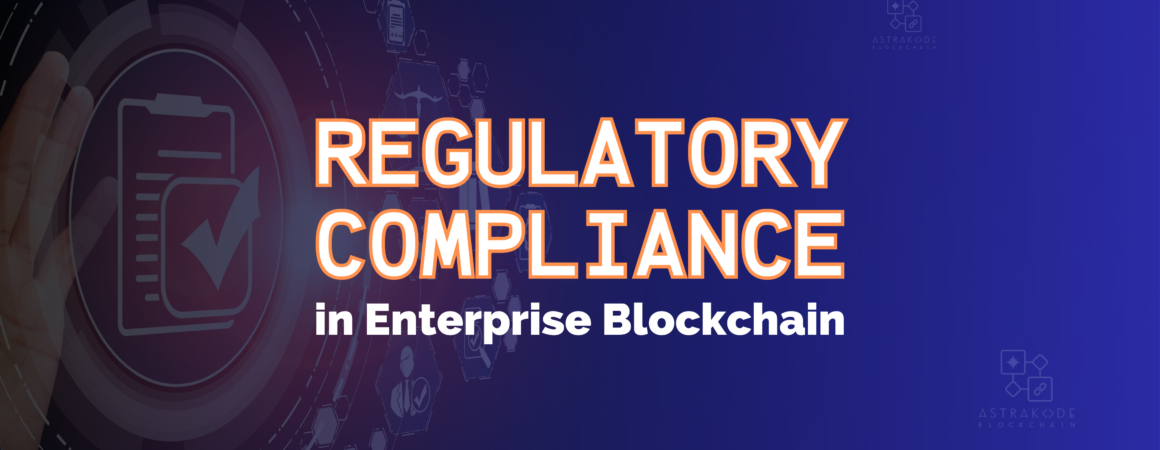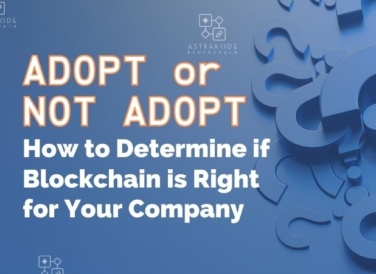
The Role of Smart Contracts in Blockchain
In the vibrant landscape of blockchain technology, smart contracts have emerged as a game-changing innovation,…

Blockchain technology has emerged as a powerful tool for businesses, enabling secure and transparent transactions across various industries. However, as enterprises adopt blockchain solutions, they must navigate a complex regulatory landscape to ensure compliance with international and local laws. This article explores the regulatory considerations and implications associated with enterprise blockchain implementation, highlighting the importance of understanding and adhering to the legal requirements.
Regulatory compliance is the practice of adhering to laws, regulations, guidelines, and specifications relevant to an organization’s operations. In the context of blockchain technology, it refers to the observance of legal stipulations that apply to blockchain networks and transactions.
As blockchain is a global and decentralized technology, compliance can be complex, potentially involving multiple jurisdictions and an array of different rules. Regulations such as Anti-Money Laundering (AML) requirements, Know Your Customer (KYC) policies, data privacy and protection laws like GDPR, and other international standards like ISO 20022 are particularly relevant.
Blockchain technology brings unprecedented advantages to the enterprise. These include enhanced transparency due to the decentralized and immutable nature of blockchain ledgers, improved efficiency and speed in transactions, reduced costs by eliminating intermediaries, and increased trust and security.
In addition, blockchain provides a better mechanism for traceability and auditability of transactions, which can support compliance efforts. The use of smart contracts can also automate compliance-related processes, making them more efficient and less prone to errors.
Despite its benefits, enterprises face numerous challenges in implementing blockchain. Understanding and complying with a complex and evolving regulatory landscape can be one of the most significant obstacles.
Data privacy, as defined by the General Data Protection Regulation (GDPR), is a major challenge. GDPR imposes strict rules on how personal data is handled, including rights to rectification and erasure. However, the immutable nature of blockchain can conflict with these principles. Once data is written onto a blockchain, it can’t be changed or deleted, which presents issues for compliance with GDPR.
Financial regulations present another significant hurdle. The Financial Action Task Force (FATF) has issued guidance for virtual assets and virtual asset service providers, which includes recommendations for anti-money laundering (AML) and combating the financing of terrorism (CFT). These requirements can be challenging to meet in a blockchain context, given its decentralized nature and the potential for pseudonymous or anonymous transactions.
AML laws themselves can be complex to navigate. These laws require organizations to monitor their customers’ transactions and report suspicious activities. In a traditional system, these responsibilities are clear-cut. But in a decentralized blockchain system, where the ‘customer’ could be anyone participating in the network, fulfilling these obligations becomes complex.
Similarly, Know Your Customer (KYC) procedures, designed to verify the identity of customers to prevent fraud and money laundering, are harder to implement in the blockchain environment. As transactions can be carried out pseudonymously, tying them to real-world identities for KYC purposes becomes a challenge.
Finally, international standards like ISO 20022, which is widely used for electronic data interchange between financial institutions, may not be natively compatible with all blockchain systems. Enterprises must work to ensure their blockchain implementations can effectively interface with these traditional systems or risk non-compliance.
These challenges underline the need for enterprises to fully understand the regulatory landscape and ensure that compliance is integrated into their blockchain strategies from the outset.
Enterprises can navigate these challenges by proactively integrating regulatory compliance into their blockchain strategies. A comprehensive understanding of the relevant regulations is critical.
Regulatory sandboxes provide a unique opportunity for enterprises to test their blockchain solutions within a controlled environment. The European Regulatory Sandbox for Blockchain, for example, provides an experimental space where businesses can trial their blockchain-based services under the supervision of national regulators. It enables organizations to understand how their innovations interact with existing regulations and where potential compliance issues might arise. The sandbox can also offer insights into how regulations might need to adapt to facilitate new technology.
Similarly, in the U.S., regulatory sandboxes like the one proposed in Arizona provide an opportunity for fintech companies to test their products under a relaxed regulatory environment. These initiatives help businesses to understand and manage regulatory risks, as well as providing regulators with insight into emerging technologies.
Beyond sandbox testing, enterprises should also seek legal and technical advice to understand and apply the regulations effectively. For instance, engaging with legal experts specializing in blockchain technology can provide a more in-depth understanding of regulatory requirements and potential pitfalls.
Privacy-preserving techniques, such as zero-knowledge proofs, can help reconcile the tension between blockchain’s transparency and data privacy regulations. Enterprises can also automate compliance using smart contracts. Read more about The Role of Smart Contracts in Blockchain in our recent article. This can streamline operations and reduce the risk of manual errors or oversights in compliance.
Integrating regulatory compliance from the outset is crucial as retrofitting compliance into an existing system can be costly and complex.
Regulatory compliance is more than a legal obligation – it’s a cornerstone for building trust and credibility in enterprise blockchain adoption. It’s a demonstrative commitment to the ethical handling of data, transparency in operations, and respect for user rights.
Importantly, compliance isn’t a static, one-off achievement. As regulations and technologies evolve, so must the compliance strategies of enterprises. Regular audits and updates are vital to maintaining a robust and compliant blockchain system.
AstraKode Blockchain (AKB), a pioneering low-code platform for assisted enterprise blockchain development, serves as a powerful ally for businesses striving to achieve regulatory compliance. Its primary advantage lies in its cost-effectiveness, a vital consideration given the traditionally high expenses associated with compliance efforts.
Compliance typically demands the involvement of an array of specialists — legal experts with technical acumen, appraisers, and others — making it a financial burden for many enterprises. AKB, however, substantially reduces these costs and complications. The platform achieves this via two key mechanisms:
Interested in learning more about how AstraKode can revolutionize your business? Discover the benefits and features in detail in our latest article “Astrakode: Simplifying Blockchain Development with Low-Code Solutions”.
Better yet, why not experience it firsthand? Sign up today and try the AstraKode Blockchain platform. With our freemium offer, you can explore the capabilities of our technology at no cost. Get a firsthand feel for the future of blockchain technology and regulatory compliance.
The legal landscape for blockchain is complex and evolving, but it is essential for enterprises to navigate this terrain effectively. By integrating regulatory compliance into their blockchain strategy, enterprises can harness the full potential of blockchain technology, delivering value to their stakeholders while managing their risk and fulfilling their legal obligations.
Sources:

In the vibrant landscape of blockchain technology, smart contracts have emerged as a game-changing innovation,…

Welcome to the exciting world of blockchain! If you’ve ever wondered what this revolutionary technology…

Blockchain technology has been a buzzword in recent years and has the potential to revolutionize…